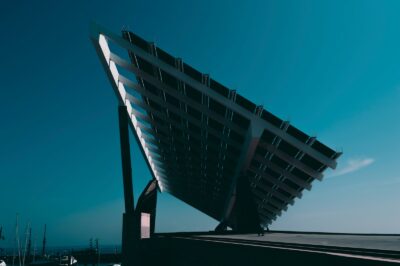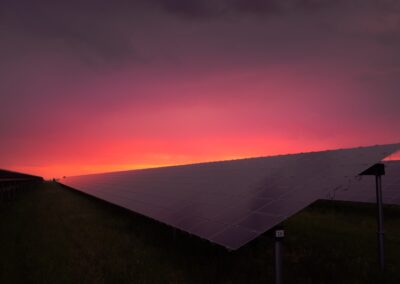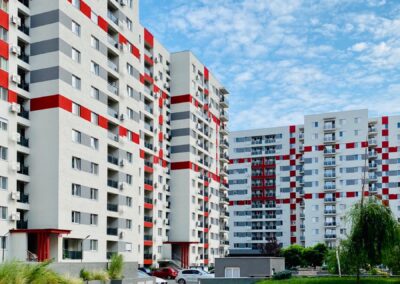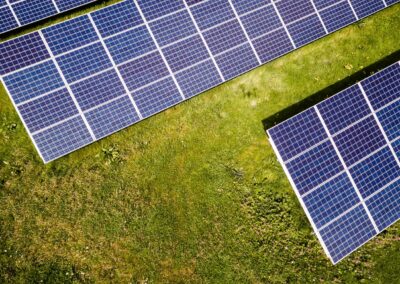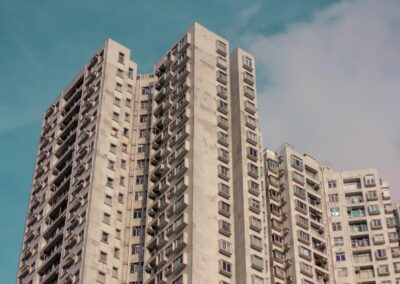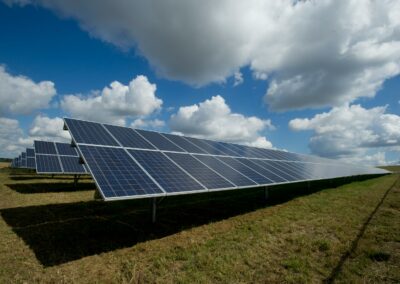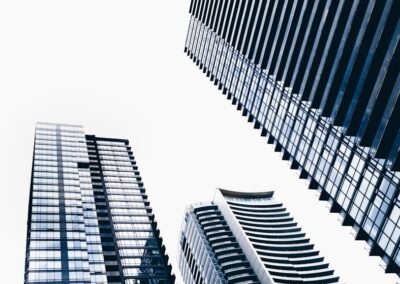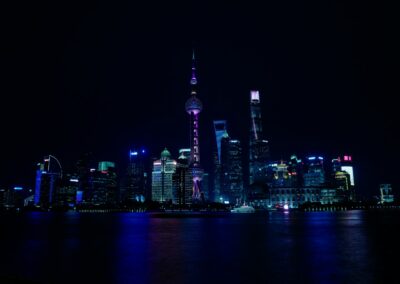The Role of Advanced Technologies in Sustainable Urban Development
Implementing Smart Building Technology in High-Rise Buildings
Smart building technology in energy optimization is revolutionizing how high-rise buildings are designed, constructed, and operated, particularly in urban centers like Saudi Arabia and the UAE. These advanced systems play a critical role in monitoring and optimizing energy use, ensuring that buildings operate efficiently and sustainably. For business executives, mid-level managers, and entrepreneurs, understanding the benefits and implementation strategies of smart building technology is crucial for enhancing overall efficiency and achieving business success.
In Riyadh, smart building technology is being integrated into new high-rise developments to create energy-efficient structures that align with the city’s sustainability goals. These systems utilize a network of sensors and Internet of Things (IoT) devices to monitor various aspects of building performance, including lighting, HVAC (heating, ventilation, and air conditioning), and energy consumption. By collecting and analyzing real-time data, smart building systems can identify inefficiencies and adjust operations automatically to reduce energy usage. This not only lowers operational costs but also minimizes the environmental impact of high-rise buildings, making them more sustainable and resilient.
Moreover, the application of artificial intelligence (AI) in smart building technology further enhances energy optimization. In Dubai, AI-powered energy management systems are being deployed in high-rise buildings to predict energy demand and optimize supply. These systems use machine learning algorithms to analyze historical data and forecast future energy needs, enabling proactive adjustments to energy consumption. For example, AI can adjust HVAC settings based on occupancy patterns and weather conditions, ensuring optimal comfort while reducing energy waste. The integration of AI in smart building technology represents a significant advancement in sustainable urban development, providing a powerful tool for achieving energy efficiency.
Additionally, the use of blockchain technology in smart buildings is emerging as a method to enhance transparency and accountability in energy management. In Saudi Arabia, blockchain is being utilized to create secure and transparent records of energy transactions within smart buildings. This technology ensures that energy usage data is tamper-proof and accessible to stakeholders, promoting trust and collaboration in energy optimization efforts. By leveraging blockchain, high-rise buildings can achieve greater transparency in their energy management practices, fostering a culture of sustainability and accountability.
Optimizing Energy Use with Smart Building Solutions
The implementation of smart building technology in high-rise buildings offers numerous benefits for energy optimization and overall efficiency. In the UAE, where urbanization and economic growth are driving the demand for sustainable infrastructure, smart building solutions are essential for creating efficient and resilient cities. These technologies enable building managers to optimize energy use, reduce operational costs, and enhance the overall performance of high-rise structures.
One of the primary advantages of smart building technology is its ability to provide real-time insights into energy consumption patterns. In Riyadh, building managers use these insights to identify areas of inefficiency and implement targeted interventions to reduce energy waste. For instance, smart lighting systems can automatically adjust brightness levels based on occupancy and natural light availability, significantly reducing electricity consumption. Similarly, smart HVAC systems can fine-tune temperature settings to match the needs of different building zones, ensuring optimal comfort and efficiency. By leveraging real-time data, smart building technology enables precise energy management, enhancing the sustainability of high-rise buildings.
Furthermore, the integration of renewable energy sources with smart building technology is transforming energy optimization strategies. In Dubai, high-rise buildings are incorporating solar panels and wind turbines as part of their energy infrastructure. Smart building systems manage these renewable energy sources, optimizing their use and storage to meet building energy demands. For example, AI algorithms can predict periods of high energy production and storage capacity, ensuring that renewable energy is utilized effectively and reducing reliance on non-renewable sources. This integration of smart technology and renewable energy creates a holistic approach to energy optimization, promoting environmental sustainability and energy resilience.
Moreover, smart building technology enhances the overall efficiency of building operations through predictive maintenance and automated controls. In Saudi Arabia, IoT sensors and AI-driven analytics are used to monitor the performance of critical building systems, such as elevators, lighting, and HVAC. These technologies can detect potential issues before they escalate, allowing for timely maintenance and repairs. Automated controls ensure that building systems operate at peak efficiency, reducing downtime and extending the lifespan of equipment. By enhancing operational efficiency, smart building technology contributes to lower maintenance costs and improved building performance, making high-rise structures more sustainable and cost-effective.
The Role of Leadership in Advancing Smart Building Technology
Leadership plays a crucial role in the successful implementation and advancement of smart building technology in high-rise buildings. Business executives, mid-level managers, and entrepreneurs in Saudi Arabia and the UAE must champion the adoption of these technologies, fostering a culture of innovation and sustainability within their organizations. Effective leadership is essential for driving the integration of smart building solutions and ensuring their long-term success.
One key aspect of leadership in smart building technology is setting clear sustainability goals and objectives. In Riyadh, business leaders are establishing ambitious targets for energy efficiency and environmental performance in their high-rise buildings. By aligning smart building initiatives with these goals, leaders can create a strategic framework for implementing energy optimization technologies. This includes investing in advanced systems, fostering collaboration among stakeholders, and promoting continuous improvement in building performance. Clear goals and objectives provide a roadmap for achieving sustainability, ensuring that smart building technology is integrated effectively into high-rise developments.
Additionally, fostering a culture of innovation and continuous learning is essential for advancing smart building technology. In Dubai, organizations are investing in training and development programs to equip their teams with the knowledge and skills needed to implement and manage smart building solutions. These programs cover various aspects of smart building technology, including IoT, AI, blockchain, and renewable energy integration. By promoting a culture of continuous learning, business leaders can ensure that their teams stay up-to-date with the latest advancements in smart building technology, driving innovation and excellence in energy optimization.
Collaboration and partnership are also critical for the successful implementation of smart building technology. In Saudi Arabia, business leaders are forging partnerships with technology providers, academic institutions, and regulatory bodies to support the development and deployment of smart building solutions. These partnerships facilitate knowledge sharing, research and development, and the adoption of best practices in energy optimization. By fostering collaboration, leaders can leverage the expertise and resources of various stakeholders, accelerating the advancement of smart building technology and enhancing the sustainability of high-rise buildings.
Conclusion: Advancing Energy Optimization with Smart Building Technology
Smart building technology plays a pivotal role in monitoring and optimizing energy use in high-rise buildings, enhancing overall efficiency and sustainability. In regions like Saudi Arabia and the UAE, the integration of advanced technologies such as IoT, AI, and blockchain is transforming the way buildings are designed and operated, promoting energy efficiency and environmental resilience. Business executives, mid-level managers, and entrepreneurs must recognize the potential of smart building technology and demonstrate strong leadership to ensure its successful implementation.
As the field of smart building technology continues to evolve, the importance of ethical leadership, innovation, and collaboration will only increase. By setting clear sustainability goals, fostering a culture of continuous learning, and promoting partnerships, leaders in Riyadh, Dubai, and beyond can drive the adoption of smart building solutions and create more efficient and sustainable urban environments. Ultimately, the successful implementation of smart building technology will pave the way for a more sustainable future, benefiting individuals, businesses, and communities for generations to come.
—
#SmartBuildingTechnology #EnergyOptimization #SmartBuildingEnergyManagement #AIinSaudiArabia #UAESmartBuildings #RiyadhEnergyEfficiency #DubaiSustainableArchitecture #IoTinBuildings #ModernTechnologyInConstruction #LeadershipInEnergyManagement



